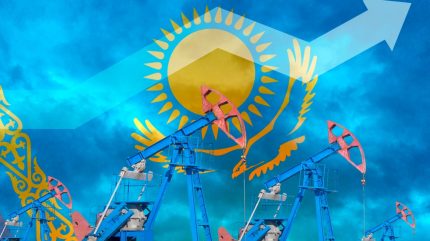
In a government meeting on 27 August, Kazakhstan’s National Economy Minister Nurlan Baibazarov announced that the country plans to increase oil production to 104.8 million tonnes (mt) per year by 2029.
This plan is aligned perfectly with the upward trajectory that has characterised Kazakhstan’s oil sector in recent years.
The country increased its production of crude oil and gas condensates by 7% in 2023, reaching 89.9mt and, according to Baibazarov, “oil output is expected to rise to 97.2mt in 2025”.
The government has budgeted the price of oil for 2025–29 at $75 per barrel (bbl), likely to be a conservative estimate given Brent’s current value of around $80/bbl, and almost $90/bbl a year ago.
As a member of oil production and policy coordination body OPEC+, Kazakhstan recently came under fire for surpassing oil production limits by 620,000 barrels per day (bpd) from January to July 2024. The limits were agreed by members to stabilise prices and maintain market share.
In late July, the country submitted a compensation proposal to OPEC to make allowances for surpassing its oil production limit by the end of September 2025.
In response to questions on how much Kazakhstan will cut down on oil production in 2024, Energy Minister Almasadam Satkaliyev told reporters that the country had “presented a correction plan, and we will implement it. There is no specific figure yet, and consultations must be held.”
Against the backdrop of OPEC+ tensions, several of Kazakhstan’s main oilfields are undergoing development and expansion, and when completed the changes could aid the country’s ambition to increase oil production.
Most recently, a service agreement was signed between Technip Energies, KPSP and Karachaganak Petroleum Operating for the development of the Karachaganak oilfield, which produced 142.7 million barrels of oil in 2023.
Kazakhstan’s largest oilfield, Tengiz, is also undergoing major expansion to increase daily production. However, majority shareholder Chevron announced in March that the project is under financial strain, facing an additional cost increase of $1.5bn on top of a total cost of $48.5bn with repeated postponements.
Markets for Kazakh oil
Alongside these developments, Kazakhstan is seeking to expand its market reach and reduce its reliance on Russian pipelines. Currently, approximately 80% of Kazakhstan’s oil exports are transported via the Caspian Pipeline Consortium’s (CPC) Black Sea terminal.
As Western countries have sanctioned Russian energy sources following Russia’s invasion of Ukraine, major oil markets have turned to Kazakhstan as an alternative source. Given the country’s proximity to Europe, the continuation of these sanctions could boost demand for Kazakh oil for several years.
In recent discussions with Azerbaijan, Kazakhstan proposed increasing transit of Kazakh oil through the country to a volume of five to seven million tonnes per annum (mtpa). This could open up further routes to markets such as Türkiye, which spends around $40bn (Tl1.36trn) every year for the imports of oil, natural gas and coal, and is only about to satisfy that demand from internal sources.
According to several media reports, earlier this year Germany asked Kazakhstan to increase oil supplies for its Schwedt oil refinery, near the Polish border, to 2mtpa. However, this depends on securing passage through Russia’s Druzhba pipeline.
In turn, Russia relies on portions of Kazakhstan infrastructure to transport oil to China, which is now a key market leverage for the country.
GlobalData upstream analyst Rami Khrais confirmed that the “Kazakh parliament recently ratified new terms for the transportation of Russian oil through the country to China. Under these new terms, crude oil supplied will increase from 7mt annually to 10mt. The new terms will remain valid until 2034 and the country is expected to gain $1.33bn in revenues as a result.”
In late August, Satkaliyev met with representatives from major Chinese energy companies and government agencies. CNPC chairman Dai Houliang and Satkaliyev reportedly addressed finalising a long-term contract for exporting Kazakh gas, constructing a new section of the Beineu-Bozoy-Shymkent gas pipeline and increasing the capacity of the Shymkent Oil Refinery.
With support from China and options for pipeline expansion beyond the CPC, Kazakhstan’s increased oil production will be able to serve an array of markets eager to do business outside of Russia.
However, while Kazakhstan is becoming an increasingly important player in global oil production, the country remains way off the top five leaders for oil production projects forecast to 2028, with China, Russia, the UK, Brazil and Canada leading the way, according to research from Offshore Technology’s parent company GlobalData.
A late September 2023 report from World Bank argued that despite Kazakhstan’s substantial oil and gas reserves and the associated fiscal power, its “public finances need improvement for the country to follow a more inclusive and resilient growth path”.




